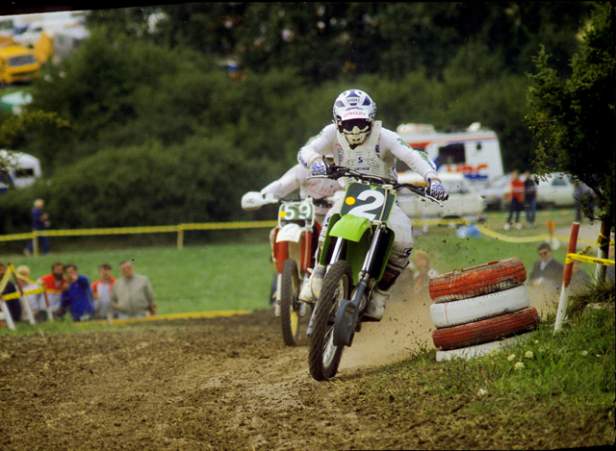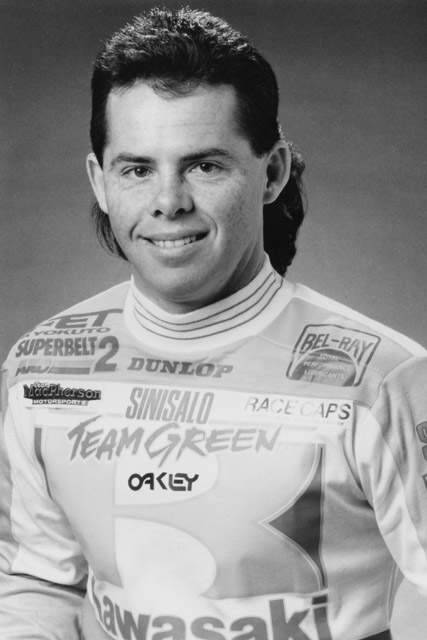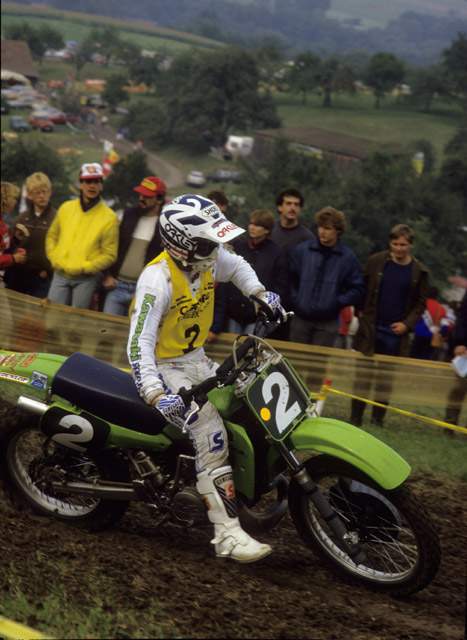Captain America: The Folklore of Jeff Ward and the Motocross of Nations
September 23, 2010, 9:43am
There is one thing about Jeff Ward and his sensational career that knocks my block off: On seven occasions he was asked to represent Team USA at the Motocross of Nations. Each and every time, he accepted, and each and every time he was a winner. Recently, I ran into Ward and asked him to talk about his memories of competing in the Motocross of Nations. A great supporter of the event, he was more than happy to provide answers to the far too many questions I asked.
Racer X: Jeff, there are countless questions I can ask you about you and your career in motor racing, but I’m going to stay specific to the Motocross des Nations, I mean the Motocross of Nations…
Jeff Ward: Yeah, that’s cool.
As far as the U.S. and our somewhat contemporary ascendency in the great event go, you’re the most successful and accomplished rider of all-time. Damn, you were on seven winning U.S. teams, right?
Yeah, seven times. So it’s a record I still hold - the only one probably [laughter].
Do you think it’s still the most important motocross race in the world?
I think it’s the most pressure, for sure. The most important? The Supercross championship in America is the biggest trophy you can get. As a motocross rider – feeling-wise - it’s the only race where we race as a nation and it’s a big pressure situation more than anything.
Damon Bradshaw recently told me that the pressure at the Motocross of Nations was pretty much intolerable for him. He explained that tension of sitting around all weekend with his stomach churning made him almost not even want to be there…
[Laughs] Yeah, it wasn’t that bad for me. At that point (Vimmerby, Sweden in 1990) he hadn’t won any championship, though really and he wasn’t used to winning championships. I felt that way my first National Championship (the 1984 125cc National Championship). It was like anxiety or, "What if something goes wrong?" You worry more about the bad stuff than actually how good you’ve been riding all year. So after the first one, the pressure is off and you just do your job. I felt like more going over there. I knew the pressure. I had it many times in motocross winning championships. It just came more naturally for me than for younger guys like Bradshaw. And for the guys going over right now, they’ve never been there, it has to be that way for them. But [Ryan] Dungey has won some championships – and has had some taken away – and has had some taken away with screw-ups, so he’s been there. So he’s got a real good chance. The other two guys are going to feel it.

Photo: Jack Burnicle
You always went to the Motocross of nations when you were asked, correct?
The only time I didn’t go was in 1986 (Maggiora, Italy) when they wanted me to ride a 125. We [Kawasaki] didn’t have a rider in the 125 class that year so we didn’t have a really good bike. I hadn’t ridden one in two years. I didn’t have the best year in 1986. I won races and could have got championships, but had bad luck. I just kind of turned it down because I was going to be the weak link.
So Johnny O’Mara took the spot and turned in one of the greatest rides in Motocross of Nations history…
Yeah, and look what happened. It was great for Johnny, but I don’t think I would have done what Johnny done. I think we would have still won, but then in 1988 I was given the opportunity to ride the 125 in France. We had Chicken [Jeff Matiasevich] riding it, so the bike was good. When I was asked to go to France, I said, "Yeah, I’m not missing another one. We have a good bike and I think I could do well." 1986 was the only time I turned it down – only because I didn’t think I was the best guy for the job.
The 1998 Motocross of Nations race in France was cool. There were 40,000 fans on the hillsides. Ron Lechien was on the KX500 and Rick Johnson on the 250. If I remember correctly, Jean-Michel Bayle was the only rider who gave you trouble. Is that race memorable to you?
Yeah, yeah. Well, I knocked Bayle down in the last moto to win the overall. It was in France and he was their #1 World Champion or whatever he was.
Were the fans pissed?
Oh yeah. I barely got out of there. On the last lap things were getting thrown at me. I couldn’t get near the spectators because somebody was going to jump out. It wasn’t a bad take-out. We both just went for the same small berm in this hardpack 180-degree turn. I just came skidding in and we hit. Boom! He went down and I stayed up and that was that.
In the past, when chosen, some U.S. riders have opted out to compete for Team USA. What do you think about that?
It’s not always fun to travel. But I think when this race comes up, I think it’s your duty for what everybody else has done for your whole career, you need to support our side of the country. The best riders go. That’s plain and simple. If you take someone’s spot, they’ll get over it. Everybody gets over it. I just don’t think it’s right to just not go.
The first year you were selected to represent Team USA was 1983. The first race was on the 500s at the Motocross des Nations in Brussels, Belgium. The second race, the Trophee des Nations – for 250cc bikes – was held a week later behind the Iron Curtain in Slovakia. From tapes I have seen, the Belgian track looked like a giant cow pasture…
Yeah, if it wasn’t there, you wouldn’t know a track was there. It was awesome. At Belgium you had guys like [Eric] Geboers and Andre Vromans and guys that were World Champions at their home track. We were on 500s, which I hadn’t raced too much. Maybe at a GP here or there. The track was gnarly and got beat up and dusty. There were a couple steep uphills that Geboers and the Euros would go up. When they would, the fans would step way back and allow their riders to go up the nice grass. And then when we’d come, they’d all close up and make us go up the real rough stuff. Then there was the apple tree turn where apples were just getting thrown at us every lap [laughs]. So, it was an experience for a young kid to go over there. It was cool to win. Czechoslovakia was another cool deal – going behind the Iron Curtain. Once we got across the border, the kids were lining the road and we were throwing stickers out and it was like candy! At the race track, it was the same thing, man. Anything they could get their hands on. We got so much Bohemian Crystal from that place. They would just bring up 15 to 20 glasses to get a jersey. I got vases and the trophies were huge vases. I still have that stuff to this day.

Photo Courtesy AMA
In 1984, you guys rode the 500s in Finland, and a week later, the 250s in Sweden. Your utter domination of the Trophee des Nations has been well documented and you’ve often said it was the best race of your career. However, the race in Ruskeasanta, Finland was an entirely different story. Can you tell me about that?
Sure, it was a bad weekend. We got lucky. Saturday in practice they had this huge tabletop. Of course the Euros had never jumped it; they had never even thought about it. I went out and cleared it in practice and came down and shifted to third and jumped off the last jump and landed in a bunch of whoops and hit a hole and cart wheeled and was knocked out. So I don’t remember that whole day. I was throwing up. I stayed in RJ’s room because they didn’t want me to sleep by myself. The whole night Ricky had to keep waking me up to make sure I wasn’t in a coma. So the next day I had to go out and perform. I holeshot the first moto and led the whole way up until the last lap and a half and [Andre] Malherbe got by me. It was a sand track and I hated sand. I was throwing up while I was riding and dizzy. Between the motos, I didn’t think I was going out for the second. I was throwing up in the bushes. In the second moto, we went through the first turn. I crashed. I got up and was like, "No big deal." I wasn’t going to ride hard anyways. But I look over and there is [David] Bailey laying there and Johnson was laying there. All three of us were down in the first turn. We all probably thought the same thing, "Oh shit!" We picked our bikes up and our eyes got huge. Johnny [O’Mara] was the only one who made it through. We all just went on a tear. Basically, we didn’t have the win until the last lap when [Kees] Van Der Veen or somebody’s forks broke off their bike. It was a bad weekend all around, but it was one of those types of things where we all dug in.
In 1985, the FIM changed the format of the newly named "Motocross of Nations" where each team had a 125cc, 250cc and 500cc rider. The race was at Gaildorf, Germany, and they put EVERYONE on the starting gate at the same time. Madness?
Yeah, we had like 64 riders on the line. [David] Thorpe rode really well there. He may have won a moto (he did). I won my class, but I was behind Thorpe and David [Bailey] in the two motos. Ronnie [Lechien] had the tough time on the 125. He was screaming that thing everywhere. But that start was like 64 guys on an airplane strip coming in. We all went into this tree turn that was still wide open, God, if you went down, you were going to get run over by a million guys. It was pretty interesting, but another fun event.
The 1987 Motocross des Nations at Unadilla has also been well documented. Can you talk about the 1989 Motocross des Nations – again at Gaildorf – where, just as Ryan Dungey will have to do this Sunday in Colorado, you raced with two Motocross des Nations rookies named Jeff Stanton and Mike Kiedrowski?
Back at Gaildorf again, this time on the 500. I won the first moto and I think won the second, but I looked at that race like a points’ race. When we had it wrapped up and I was in second, there was no need for me to even try to catch the leader. People think, "Oh, you got beat." Well, no, if had to run him down to win, I could have - or I would have. It was another good weekend. Kiedrowski rode great because he rode a 125 well. Stanton was also really on it and won his class.
Then came your last career appearance at the Motocross des Nations at Vimmerby, Sweden in 1990. You guys dodged a bullet at that one!
Stanton saved the day there. I was mediocre on the 500 in the sand (Ward placed second in the opening moto and blew out a shock in the final moto). I still hung in there. I was second or third, you know? I wasn’t way back. The first moto wasn’t the best with me with a second and [Damon] Bradshaw fourth. We were struggling. In the last moto, Stanton was dead last and he came flying by. I let him go bye. He was on a mission. He had to catch whoever was leading, and he did, thank God, because we weren’t doing anything special (Stanton passed second place rider Jeff Leisk to give Team USA enough points for the win).

Photo: Racer X Archives
Did it feel as good to win every time? I mean, was every Motocross of Nations win for you as big a rush?
Yeah. It just got bigger and bigger. We got more liked as we got going. Before, at the beginning back in the early 1980s, we were hated. It wasn’t fun going. I mean we had no friends. It was sabotage from the day we got there. In 1984, when we went testing, my bike seized every time I rode it. They gave us the wrong fuel. And they kept giving us the wrong fuel. They were like, "Here’s the right fuel!" We’d put it in and my bike would seize. One year we have a practice track all set up for us. Roger [DeCoster] has it all set up. So we’re driving for hours to get to this practice track. We get there and the farmer says, "You’re not coming in!" So we can’t get in and we don’t get to ride. Nobody would help us.
I really don’t mean it in a negative way, but there’s no doubt in my mind that the race has become America against the world. Would you agree?
Yeah. Back then it was more Europe versus America because they were the dominant outdoor riders. We had supercross, but it still wasn’t as big as it is today. But in the outdoors, they just were still flat-out hauling ass. They were fast. We were going into their territory and they were like, "We own it. We’re the guys." Now it’s us against them where before it was just kind of them against us. It's reverse roles now. And now it’s even harder if you’re American. You don’t want to be up on that podium with third or second place. When they get on the podium, they’re pumped; they’re still pretty happy. They’re not expected to win. It’s a different deal now to lose. This year has got a lot of pressure. These guys have a lot of pressure. I don’t envy them at all.
The Motocross of Nations has become so big, glamorous and prestigious. I’d assume it’s pretty damn cool to walk around knowing that you are the most successful rider from the nation that now has the most victories in the 63-year-history of the event…
Yeah, it’s very cool to be winningest rider. I’ve never lost a race. It is definitely the highlight of my whole career to be able to be on that team and win it all the time. It was all pretty cool.


